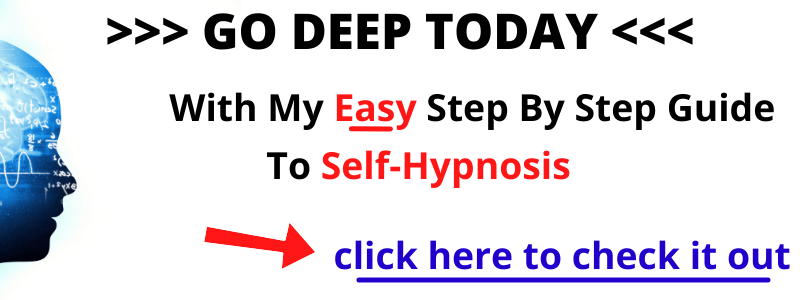When a subject is cloaked in mystery like hypnosis is, it’s only natural to ask whether it’s dangerous.
So can hypnosis be dangerous? The short answer is that most of the time hypnosis is completely safe. In this article, I’ll go over why that is, and I’ll cover some situations where hypnosis can indeed be dangerous.
Normally I start these articles off with a quick introduction of what hypnosis actually is, because most people don’t know.
For our purposes here, hypnosis is a state in which our normal conscious fact-checking processes are set aside for a brief while. This enables us to more easily explore new possibilities and make changes that we’d like to have happen.
Read more: How Does Hypnosis Work?
As you might imagine, setting aside our regular fact-checking processes can carry some risks. But probably not as many as you might expect.
Dangers of Hypnotherapy
Hypnotherapy is a modality in which the practitioner uses their knowledge of hypnosis to help people with a wide range of issues. Because hypnosis itself is an enhanced learning process, the scope here is vast. Hypnotherapy has been used to help people to quit smoking, to lose (or gain) weight, to minimize physical pain, to overcome anxiety, to overcome virtually all fears and phobias, and for many, many more things.
Essentially, just about anything that can go wrong inside a mind can potentially be helped with hypnotherapy. As you might expect, since the purpose of hypnotherapy is to help people, the risks are minimal and are managed by the hypnotherapist.
So what are those risks?
Hypnotherapy is mostly unregulated
In many parts of the world, hypnotherapy is not controlled by legislation or regulations. This means that there’s nothing preventing people from simply calling themselves hypnotherapists even when they lack the necessary skill set.
In a capitalist society, this is a self-solving problem, since as with all businesses, the bad ones tend to go under. So if you see a random hypnotherapist, it’s likely that they possess the necessary skills.
Abreactions
Whenever we do anything that involves digging around inside the mind, there’s the possibility that we might trigger a strong negative reaction. This is not caused by the hypnosis itself, but by the subject’s past experience of life. Unless the subject tells us, we have no way of knowing that they were abused or bullied or had some other negative experience.
Luckily, dealing with abreactions like this is a part of most hypnosis trainings, so it’s something that all hypnotists should know how to deal with. A skilled hypnotherapist will exploit the abreaction to help you to grow and overcome your problems, while a less skilled one will simply shut the abreaction down. Either way, it’s very unlikely that you’ll be worse off afterwards than you were going into the session.
Contact lenses
In any hypnosis session, it’s possible for the eyes to roll back. If this happens when someone is wearing contact lenses, it can be bad. This one is very easy to work around: Simply remove any contact lenses before your session.
False memories
A few years back I was watching a popular show about strange things out in the world. Naturally one of the episodes was about aliens and alien abductions. In this particular episode, the writers decided that since hypnosis can be used to retrieve memories, it would be a good idea to get a hypnotherapist on.
They proceeded to show the hypnotherapist supposedly hypnotizing someone to retrieve lost memories.
I was horrified. Before my eyes, this hypnotherapist installed the memories of an alien abduction. Prior to her interference, it’s unlikely they existed. Far from retrieving lost memories, she was creating them from scratch.
There are technologies in hypnosis such as clean language that have been specifically designed to avoid this kind of issue. Unfortunately, as with every career, practitioners exist at a wide range of skill levels. Most of us are aware that false memories can be created, and take steps to avoid doing so.
In the show, it was quite clear from the hypnotherapist’s expressions and mannerisms that she genuinely believed she was retrieving lost memories and had no clue that she was creating them.
So what can you do about it? It’s easy: Don’t see a hypnotherapist to retrieve lost memories. If you’re not a hypnotist yourself, you have no way of knowing if they possess the necessary skills.
Pain suppression
Did you know that hypnosis can be effective at suppressing pain?
In fact, it’s so effective that it’s sometimes possible to completely turn off even the most intense pain. Permanently.
So how is that a problem? Well… pain is an important signal in the body. Without it, we don’t know when things go wrong. And those things may require medical treatment.
If you’re seeing a hypnotherapist for pain control, always get approval from an appropriate medical professional first. That’s usually your GP.
Most hypnotherapists won’t take away your pain without a referral from a doctor, but there are always some who think they know better. Play it safe, and don’t even ask without first checking with your doctor.
Operating machinery and driving
Most forms of hypnosis lead to altered states of mind. This is a good thing, but it does have some consequences. If you’ve gone to a hypnotherapist’s office, they will usually make sure you’re all the way out of hypnosis before they send you back out into the world. With online hypnosis, you have to do that part yourself.
The good news is that it’s very easy to tell when you’re still a bit zoned out. When you’re hypnotized, you’ll become aware of what it feels like, and you’ll generally be able to tell whether you’re out of it yet. The longest I’ve ever known it to take me to come all the way out of a deep hypnotic trance is about an hour. Usually it is near-instantaneous.
To be safe, don’t drive or operate machinery immediately after a hypnotherapy session. And never listen to hypnosis recordings while driving or operating machinery.
Headaches
Sometimes people report that they have experienced headaches after hypnosis sessions of all kinds, including hypnotherapy.
All I can say about this one is that, first, it’s also reported that such headaches tend to clear very quickly. And second, in hypnotizing thousands of people, I’ve never once had one of them report resultant headaches.
While it is possible to intentionally cause headaches with hypnosis, hypnotherapists are disinclined to do this. So I strongly suspect that it’s a myth. Even if it’s not, these apparent headaches clear very quickly, and are probably caused by the hypnotist using more force than is necessary.
Just how much force is necessary in a hypnosis session? None at all.
And you can look at it like this: Suppose you see a hypnotherapist and they help you to quit smoking for life. If part of that is that you have a headache for a couple of hours, is that really so bad? In this case, the benefits far outweigh the cost.
Overall
The risks of hypnotherapy are tiny compared to the possible gains. And when you have a competent hypnotherapist, part of their job is to manage those risks for you. So long as you follow their instructions, and don’t ask them to help you retrieve lost memories, it’s very likely that you’ll have only good outcomes.
Dangers of Being a Hypnotist
So far we’ve talked about some of the dangers of being hypnotized. But what about the dangers of being a hypnotist?
As it turns out, there are a few, but they are mostly resolved with the skill set that you learn when you become a hypnotist.
People can have very strong views about hypnosis
As I’ve mentioned previously, most people out in the world have no clue what hypnosis actually is. Their views are informed by popular culture, rather than science and reality.
Hypnosis has been around for centuries, and has been tested to the extent that we know it’s a real phenomenon that can have enormous benefits.
Nevertheless, people’s lack of knowledge about what hypnosis actually is can lead to highly polarized views.
The solution: Don’t tell them unless it’s important for the context in question.
People can think you’re a fraud
Since most people don’t know what hypnosis is, this can lead to them thinking that you’re a fraud. There are a few ways to handle this one.
First, you can simply refer to yourself as something other than a hypnotist. If you only see customers for quit smoking hypnotherapy, call yourself a quit smoking specialist and don’t mention how you do it. If you only see people for weight loss, find a title related to that.
Naturally, if you’re doing stage shows, it will probably work to your benefit to call yourself a hypnotist.
Context is important.
Second, when people ask you what you do, you can show rather than tell. This means that you just say something like Hrm… it’s really hard to explain… How about a quick demonstration?
And third, if you really like uphill battles, you can attempt to educate them as to the error of their ways. Generally this one is only worth pursuing if you enjoy winding people up and messing with them.
Hypnosis can be difficult to put on your resume if you work in multiple industries
Before I was a hypnotist, one of my careers was working in IT designing and building back-end database systems.
I love working in IT, so sometimes I apply for jobs to keep myself current, and because it’s fun.
For quite some time, I never bothered to mention that I am a hypnotist on my CV. If you’re wondering, a CV is just our New Zealand version of a resume.
The reason for this is the highly polarized views I mentioned above.
Then one day it hit me: If someone has a highly negative view of hypnosis, they’re exactly the kind of person I don’t want to work for anyway.
These days, my CV proudly proclaims that I am a hypnotist and lists my various certifications.
Other hypnotists may try to mess with you
People tend to get into hypnosis for only a handful of reasons. As you might imagine for an industry where the widely known careers are hypnotherapist and stage hypnotist, there are two broad categories here.
Many of us get into hypnosis because we’ve had an experience where it helped us greatly, and we want to share that with others. We tend to become hypnotherapists.
And many of us get into hypnosis because we saw a stage show and it looked like fun, so we decide to become a stage hypnotist.
You can probably see where this is going. The kind of person whose job is to mess with people on stage in front of others is probably inclined to mess with people.
And guess who hypnotists often choose to hang out with?
That’s right… other hypnotists.
Dangers of Dark Hypnosis
So far we’ve covered the use of hypnosis for things that are of benefit to others. Regardless of whether it’s hypnotherapy or a stage show, it’s still beneficial.
But there’s another side to hypnosis.
Hypnosis is a tool, and like any tool, it can be wielded for good and for evil.
The human mind is strongly inclined towards negativity. This is a survival characteristic that served our ancestors well.
The end result of this inclination towards negativity is that it’s actually easier to run hypnotherapeutic processes in reverse than it is to run them in the direction intended.
The good news is that most people out in the world want to make a positive contribution rather than a negative one.
So even though dark hypnosis exists, you’re very unlikely to encounter it.
It does exist though. And people have designed and tested processes that use it. These include processes to cause things like demotivation, depression and migraines.
Luckily virtually no-one knows about these processes. Not only that, but almost all hypnotists are strongly inclined towards helping people rather than the opposite. Far more so than the regular population.
So what can you do about it?
First, if you suspect a dark hypnotist is doing something negative to you, walk away.
And second, if you notice the effects, book a session with a skilled hypnotherapist to help undo them. Do this sooner rather than later, as the effects of dark hypnosis are generally designed to be self-magnifying over time.
Hypnosis in the Media
No article on the dangers of hypnosis would be complete without a mention of the hypnosis that’s around us all the time.
Ads and marketing
These days, virtually all ads that we encounter have some basis in hypnosis. Most of the time this works to our benefit, and isn’t really something to be concerned about.
The thing is, almost all of us are dependent on income from a business. There are lots of ways this can happen. We might own the business ourselves or be an employee. We might have a partner or family supporting us and they earn the income. Or we might own stocks and shares, which is essentially the same thing as owning a part of the business.
And those businesses from which we derive our income all use these ads.
Put another way, if these ads didn’t exist, we wouldn’t get paid.
In many parts of the world there are laws and regulations that prevent people from blatantly lying in their advertisements.
Effective ads and marketing work by saying something like Hey! You’ve got this problem! I’ve got a solution for that!
So let me ask you this: If you have a problem, and someone else has a solution for it, isn’t it in your interests to let them tell you about it as efficiently as possible?
So how do you keep yourself safe? It’s easy: Always ask yourself whether something seems plausible.
If your local hardware store tells you that they’ve got a hammer for 20% off the usual price this weekend only, it’s reasonably likely that you can believe them. And you’ll quickly spot the ones that you can’t believe.
Similarly, if someone tells you that they can help you to quit smoking… that’s something that countless people have done even though it might seem impossible when you’re in the smoking trap. A quick look at the copious resources available will easily convince you of this.
By the same token, if a random stranger tells you that you can get a guaranteed 100% return on your investment within a month… a quick look at the growth patterns of real companies will tell you that it’s highly likely to be nonsense.
Politics
One of the things I found astounding when I first became a hypnotist was watching politicians through the eyes of a hypnotist. Everything they do is designed to get them elected. And most of them use covert hypnosis in its various forms to aid them in that. Naturally, some of them are much better at it than others.
What can you do about it? Take the time to actually sit down and think about the issues. Figure out what’s important to you, and then use your judgment to choose who’s most likely to help with that.
As with the other ads, if a politician claims that they’re going to spend an additional trillion dollars on something, it’s prudent to wonder where that’s going to come from.
Cults and organized religion
Cults and religions use hypnotic processes to indoctrinate their followers.
How can you protect yourself against it? In exactly the same way as the others: use your common sense and judgment to decide if you like what they’re saying.
If they’re preaching tolerance and being nice to people, you’re probably safe. If they’re preaching hatred, persecution and intolerance, or even war, run.
Wars and persecution
As you might imagine, exactly the same processes that can create a cult can be used to turn ordinary people into soldiers and get them fighting for your cause. It’s the same thing with persecution.
The best way to defend against these processes is to be better at it yourself. Or just walk away.
Ultimately though, when these things happen, it’s important to stand up for what you believe to be true. If someone tries to sway your thinking, listen to them, and then apply your own rational judgment. You won’t always be right, so use hypnosis on yourself to help you to release any old views you might have had that no longer serve you. And when you are right, use hypnosis on them to help them to take on your views.
Self-Hypnosis
Ultimately, what it all comes down to is that far from being dangerous, hypnosis is usually very safe. In the cases where it’s less than completely safe, it helps immeasurably if you possess the tools to detect such things happening.
The first part of that is learning how to hypnotize yourself. With self-hypnosis, you’re the one in control, which means that it tends to be completely safe. Really it’s nothing more than a form of focused daydreaming with intent.
If you’d like to know more about how to hypnotize yourself so that you can better protect yourself against anything that might go wrong, you can find easy instructions in my article on how to do self-hypnosis. To help keep you safe, I’ve also included a simple trigger that you can set up so that after the first few times you can get yourself into hypnosis and protected almost instantly.





